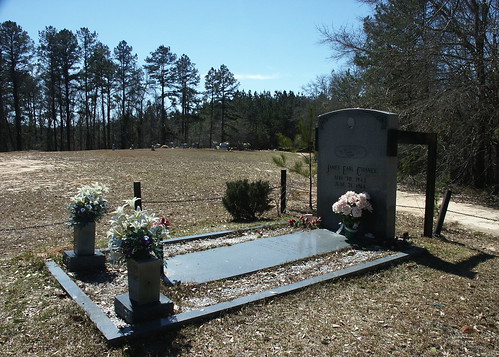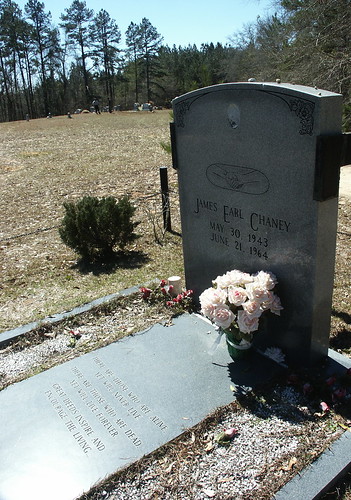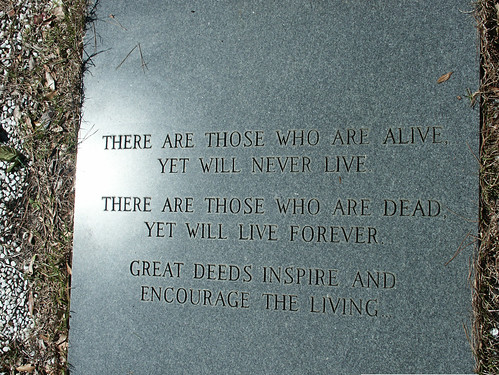This was the first article that I saw this morning:
See: BBC Article about the trial of one of the accused murderers of
In 1964, I was thirteen years old. Now, many years later, I still can't get the images of the epic drama of those three murdered Civil Rights workers. They were murdered on a dusty road off the interstate in rural Mississippi. I can't get them off my mind. Perhaps itwas the active mind of a thirteen-year-old, perhaps it was the way the whole murder mystery played out on TV. That summer, CORE (Congress of Racial Equality) and SNCC (Student Non-Violent Coordinating Committee) workers had dubbed it "Freedom Summer." In the middle of that sweltering Mississippi summer an investigators had stared into the disappearances of these three brave young men in a massive man hunt. In a massive case of temporary blindness the authorities dragged the rivers and streams. The badly beaten and shot bodies of the the three The badly beaten and decomposing bodies of the the three were found in an earthen damn. They had each been shot. The worst punishment was handed out to James Chaney the black Civil Rights worker. In the end a few local klansmen were rounded up for a show trial.
In 2007, following the 40th commemeration of "Bloody Sunday", in Selma Alabama, I was privileged to trace the journey of these three young men along the route that led them to their deaths. Having visited all of the sites along this path of terror from Philadelphia to Meridian Mississippi -- the church, the jail, the spot where they were stopped on the hiway -- two things stand out in my mind: Michael Schwerner's last words, which were recited to us by Mr. Roy Clemons of the NAACP, as we stood in the exact spot where the three men were brutally murdered. Right before his execution Mr Michael Schwerner who was the original target of the assignation plot said to the man who would end his life. Schwerner said 'Sir, I know just how you feel,"
"Philip Dray, co-author of the 1988 book on the trio's killings, We Are Not Afraid, said what's remarkable is how nonviolent the civil rights activists were during the 1960s.
Dray said that's demonstrated by how the trio reacted to the Klan the night they were killed — as shown in confessions given the FBI.
"Even as Mickey Schwerner was being pulled from the COFO station wagon to his death, he was still attempting to peacefully reach out to the men in the lynch mob, assuring gunman Alton Wayne Roberts, 'Sir, I know just how you feel,' " Dray said. "Roberts was a violent man, a man of action who was afraid of no one, but he'd never encountered Schwerner's brand of courage."
See: Clarion Ledger Timeline and stories about the case.
But equally chilling was standing over a lonely gravesite. Like a cry from the other side are the words on James Cheney's tombstone nestled at the top of a tranquil small cemetery in Meridian, Mississippi. His gravesite has been continually despoiled since it was consecrated 43 years ago. The inscription on the tombstone is chilling though for friend and foe alike.



"There are those who are alive
Yet will never live
There are those who are dead
Who will live forever
Great deeds inspire
And encourage the living"
See: Mississippi Clarion Ledger 6/21/2005 (First Day of Summer) Cheers greet Killen guilty verdict, called 'sign this town has changed'
PHILADELPHIA — A jury today found Edgar Ray Killen guilty of manslaughter in the 1964 slayings of civil rights workers James Chaney, Andrew Goodman and Michael Schwerner.....
The verdict comes 41 years to the day after the trio was killed. The three had come to Philadelphia to investigate the burning of a black church in Neshoba County.
The verdict "signifies this county has dealt with its past and is ready to move on to the future," said Leroy Clemens, co-chairman of the Philadelphia Coalition, a citizens' group dedicated to pushing for justice in the case.
See: New York Times: 6/21/2005 (First Day of Summer) Mississippi Jury Convicts Ex-Klansman in 1964 Killings
PHILADELPHIA — A jury today found Edgar Ray Killen guilty of manslaughter in the 1964 slayings of civil rights workers James Chaney, Andrew Goodman and Michael Schwerner.
Mr. Killen, 80, who had been free on bond, was immediately taken into custody. He faces up to 20 years on each of the three manslaughter counts. Sentencing was set for 10 a.m. on June 23.
Relatives of the victims said at a televised news conference that the trial was an important step but that the lesser conviction demonstrated the need for justice for the victims of crimes committed during the civil rights era.
"The fact that some of these jurors have lived all these years, and could not bring themselves to recognize that these were murders, indicates that there are still some people among you who choose to look aside, who choose to not see the truth," said Rita Bender, the widow of one of the victims, Michael Schwerner.
See: New York Times 06/17/2005 Widow Recalls Ghosts of '64 at Rights Trial
"You're treating this trial as the most important trial of the civil rights movement because two of these three men were white," she said. "That means we all have a discussion about racism in this country that has to continue. And if this trial is a way for you to all acknowledge that, for us to all acknowledge that and to have that discussion openly, then this trial has meaning."
Ms. Schwerner, now Rita Bender
See: Washington Post Article Trial Revisits '64 Racial Divide in Slayings
"Prosecutors, in a brief opening statement, painted Edgar Ray Killen as a mastermind, a ruthless enforcer of Klan hatred who ordered the killings of James Chaney, Andrew Goodman and Michael Schwerner. Killen was so attentive to detail that he reminded the men in his mob to pick up gloves before the killings, Attorney General Jim Hood told the jury, which consists of nine white and three black members."
See: Mississippi Clarion Ledger Article on the murders
See: Biographies of the three youg men
See: An article by Ben Cheney James Cheney's brother.
See: Hungry Blues Article which includes comments from Michael Schwerner's brother.
See: BBC Article about the trial of one of the accused murderers of
 |
| Schwerner / Cheney / Goodman
Poster of missing Civil Rights workers
killed in the service of their fellow human beings.
|
In 2007, following the 40th commemeration of "Bloody Sunday", in Selma Alabama, I was privileged to trace the journey of these three young men along the route that led them to their deaths. Having visited all of the sites along this path of terror from Philadelphia to Meridian Mississippi -- the church, the jail, the spot where they were stopped on the hiway -- two things stand out in my mind: Michael Schwerner's last words, which were recited to us by Mr. Roy Clemons of the NAACP, as we stood in the exact spot where the three men were brutally murdered. Right before his execution Mr Michael Schwerner who was the original target of the assignation plot said to the man who would end his life. Schwerner said 'Sir, I know just how you feel,"
"Philip Dray, co-author of the 1988 book on the trio's killings, We Are Not Afraid, said what's remarkable is how nonviolent the civil rights activists were during the 1960s.
Dray said that's demonstrated by how the trio reacted to the Klan the night they were killed — as shown in confessions given the FBI.
"Even as Mickey Schwerner was being pulled from the COFO station wagon to his death, he was still attempting to peacefully reach out to the men in the lynch mob, assuring gunman Alton Wayne Roberts, 'Sir, I know just how you feel,' " Dray said. "Roberts was a violent man, a man of action who was afraid of no one, but he'd never encountered Schwerner's brand of courage."
See: Clarion Ledger Timeline and stories about the case.
But equally chilling was standing over a lonely gravesite. Like a cry from the other side are the words on James Cheney's tombstone nestled at the top of a tranquil small cemetery in Meridian, Mississippi. His gravesite has been continually despoiled since it was consecrated 43 years ago. The inscription on the tombstone is chilling though for friend and foe alike.



"There are those who are alive
Yet will never live
There are those who are dead
Who will live forever
Great deeds inspire
And encourage the living"
See: Mississippi Clarion Ledger 6/21/2005 (First Day of Summer) Cheers greet Killen guilty verdict, called 'sign this town has changed'
PHILADELPHIA — A jury today found Edgar Ray Killen guilty of manslaughter in the 1964 slayings of civil rights workers James Chaney, Andrew Goodman and Michael Schwerner.....
The verdict comes 41 years to the day after the trio was killed. The three had come to Philadelphia to investigate the burning of a black church in Neshoba County.
The verdict "signifies this county has dealt with its past and is ready to move on to the future," said Leroy Clemens, co-chairman of the Philadelphia Coalition, a citizens' group dedicated to pushing for justice in the case.
See: New York Times: 6/21/2005 (First Day of Summer) Mississippi Jury Convicts Ex-Klansman in 1964 Killings
PHILADELPHIA — A jury today found Edgar Ray Killen guilty of manslaughter in the 1964 slayings of civil rights workers James Chaney, Andrew Goodman and Michael Schwerner.
Mr. Killen, 80, who had been free on bond, was immediately taken into custody. He faces up to 20 years on each of the three manslaughter counts. Sentencing was set for 10 a.m. on June 23.
Relatives of the victims said at a televised news conference that the trial was an important step but that the lesser conviction demonstrated the need for justice for the victims of crimes committed during the civil rights era.
"The fact that some of these jurors have lived all these years, and could not bring themselves to recognize that these were murders, indicates that there are still some people among you who choose to look aside, who choose to not see the truth," said Rita Bender, the widow of one of the victims, Michael Schwerner.
See: New York Times 06/17/2005 Widow Recalls Ghosts of '64 at Rights Trial
"You're treating this trial as the most important trial of the civil rights movement because two of these three men were white," she said. "That means we all have a discussion about racism in this country that has to continue. And if this trial is a way for you to all acknowledge that, for us to all acknowledge that and to have that discussion openly, then this trial has meaning."
Ms. Schwerner, now Rita Bender
See: Washington Post Article Trial Revisits '64 Racial Divide in Slayings
"Prosecutors, in a brief opening statement, painted Edgar Ray Killen as a mastermind, a ruthless enforcer of Klan hatred who ordered the killings of James Chaney, Andrew Goodman and Michael Schwerner. Killen was so attentive to detail that he reminded the men in his mob to pick up gloves before the killings, Attorney General Jim Hood told the jury, which consists of nine white and three black members."
See: Mississippi Clarion Ledger Article on the murders
See: Biographies of the three youg men
See: An article by Ben Cheney James Cheney's brother.
See: Hungry Blues Article which includes comments from Michael Schwerner's brother.



